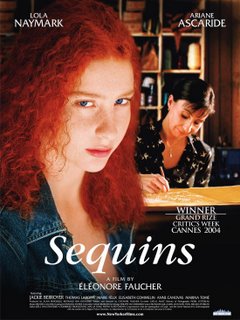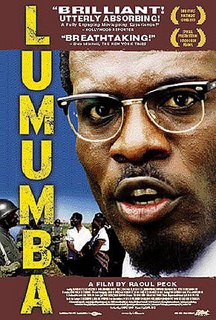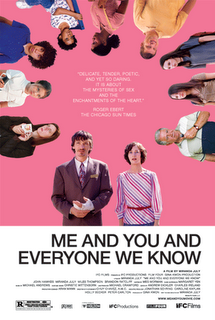Three Movies I Didn't Have Time To See
There are a million joys of working at the library. One of the many things I love about my work is reading review journals and selecting materials for our collections. I'm especially fond of Video Librarian, a journal that reviews all matters of new and reissued films, both feature and documentary, for all ages. In every issue I discover dozens of great films I'd love to see. With this list in hand, I then go through the library catalog and request the movies to be delivered to my home library.
This week, five DVDs arrived on the same day. I knew there was no way I could see them all before I went on vacation. So, I had to pass these by, at least for the moment...
Sequins
 The hand-woven designs and luxurious embroidery of two women's work become the visual basis of this masterfully observed French tale of an unlikely friendship between two women of different ages, classes and cultures. Using embroidery as a metaphor for the steady weaving together of two very dissimilar souls, Eléonore Faucher's debut film has been compared to Girl With a Pearl Earring for the beauty of its lighting and the detailed depth of its photography.
The hand-woven designs and luxurious embroidery of two women's work become the visual basis of this masterfully observed French tale of an unlikely friendship between two women of different ages, classes and cultures. Using embroidery as a metaphor for the steady weaving together of two very dissimilar souls, Eléonore Faucher's debut film has been compared to Girl With a Pearl Earring for the beauty of its lighting and the detailed depth of its photography. Young and pregnant, Claire decides to flee the questions of her family and friends by taking refuge as an apprentice to Madame Melikian, a strange, lonely woman who owns an embroidery business. Fearful of her advancing pregnancy, doubtful if she even wants a baby, Claire develops a fateful connection with the bereaved Madame, whose son was killed in a motorcycle accident. In the shadows of shawls and fabric hangings, an unspoken bond slowly builds between these two easily unraveled women, one that grows from diverse strands of suspicion and emotion into a common thread.
Sequins discovers a surprisingly fresh beauty in familiar tones, that of women adjusting to one another and of the doubts inherent in becoming a mother, or in suddenly losing a child. Pierre Cottereau's cinematography and Francois Guillaume's sound design enhance the film's understated mood, capturing how fabric gleams in a certain shadow or how the rhythm of needles echoes through cloth, and of how single stitches can be united with work, camaraderie and love.
I read a nice review here.
Ten
 Celebrated Iranian writer-director Abbas Kiarostami (Taste of Cherry, Close-Up) once again casts his masterful cinematic gaze upon the modern socio-political landscape of his homeland, this time as seen through the eyes of one woman as she drives through the streets of Tehran over a period of several days. Her journey is comprised of ten conversations with various female passengers, including her sister, a hitchhiking prostitute and a jilted bride, as well as her imperious young son. As Kiarostami's "dashboard cam" eavesdrops on these lively, heart-wrenching road trips, a complex portrait of contemporary Iran comes sharply into focus. Calling it a "work of inspired simplicity," A.O. Scott in The New York Times wrote that Kiarostami, "in addition to being perhaps the most internationally admired Iranian filmmaker of the past decade, is also among the world masters of automotive cinema...He understands the automobile as a place of reflection, observation and, above all, talk."
Celebrated Iranian writer-director Abbas Kiarostami (Taste of Cherry, Close-Up) once again casts his masterful cinematic gaze upon the modern socio-political landscape of his homeland, this time as seen through the eyes of one woman as she drives through the streets of Tehran over a period of several days. Her journey is comprised of ten conversations with various female passengers, including her sister, a hitchhiking prostitute and a jilted bride, as well as her imperious young son. As Kiarostami's "dashboard cam" eavesdrops on these lively, heart-wrenching road trips, a complex portrait of contemporary Iran comes sharply into focus. Calling it a "work of inspired simplicity," A.O. Scott in The New York Times wrote that Kiarostami, "in addition to being perhaps the most internationally admired Iranian filmmaker of the past decade, is also among the world masters of automotive cinema...He understands the automobile as a place of reflection, observation and, above all, talk."Lumumba
 Lumumba: la mort du Prophete offers a unique opportunity to reconsider the life and legacy of one of the legendary figures of modern African history. Like Malcolm X, Patrice Lumumba is remembered less for his lasting achievements than as an enduring symbol of the struggle for self-determination. This deeply personal reflection by acclaimed fimmaker Raoul Peck on the events of Lumumba's brief twelve month rise and fall is a moving memorial to a man described as a giant, a prophet, a devil, "a mystic of freedom," and "the Elvis Presley of African politics."
Lumumba: la mort du Prophete offers a unique opportunity to reconsider the life and legacy of one of the legendary figures of modern African history. Like Malcolm X, Patrice Lumumba is remembered less for his lasting achievements than as an enduring symbol of the struggle for self-determination. This deeply personal reflection by acclaimed fimmaker Raoul Peck on the events of Lumumba's brief twelve month rise and fall is a moving memorial to a man described as a giant, a prophet, a devil, "a mystic of freedom," and "the Elvis Presley of African politics."If this is a film about remembering, it is even more a film about forgetting. It is not so much a conventional biography as a study of how Lumumba's legacy has been manipulated by politicians, the media and time itself. Haitian filmmaker Raoul Peck meditates on his own memories as the privileged son of an agricultural expert working for the regime which displaced Lumumba. He examines home movies, photographs, old newsreels and contemporary interviews with Belgian journalists and Lumumba's own daughter to try to piece together the tragic events and betrayals of 1960.
A film essay in the tradition of Night and Fog or The Sorrow and the Pity, Lumumba explores how any image inevitably represses the multiple stories surrounding it, how the past as preserved by the media is always in a sense the hostage of history's winners. Therefore present-day Europe figures as prominently in Lumumba as the Congo in 1960, because Europe was the unseen hand behind the camera and the events leading to Lumumba's assassination. Peck presents an unfamiliar Europe seen through the eyes of a visitor from the Third World - cold, affluent, a guilty present trying to forget its past. Yet, as this film testifies, Lumumba's prophecy will not be silenced until Africa achieves its second independence where the promises of the first can be fulfilled.
I hope to have the opportunity to see these in the near future.
What are some of the films on your list this summer?







